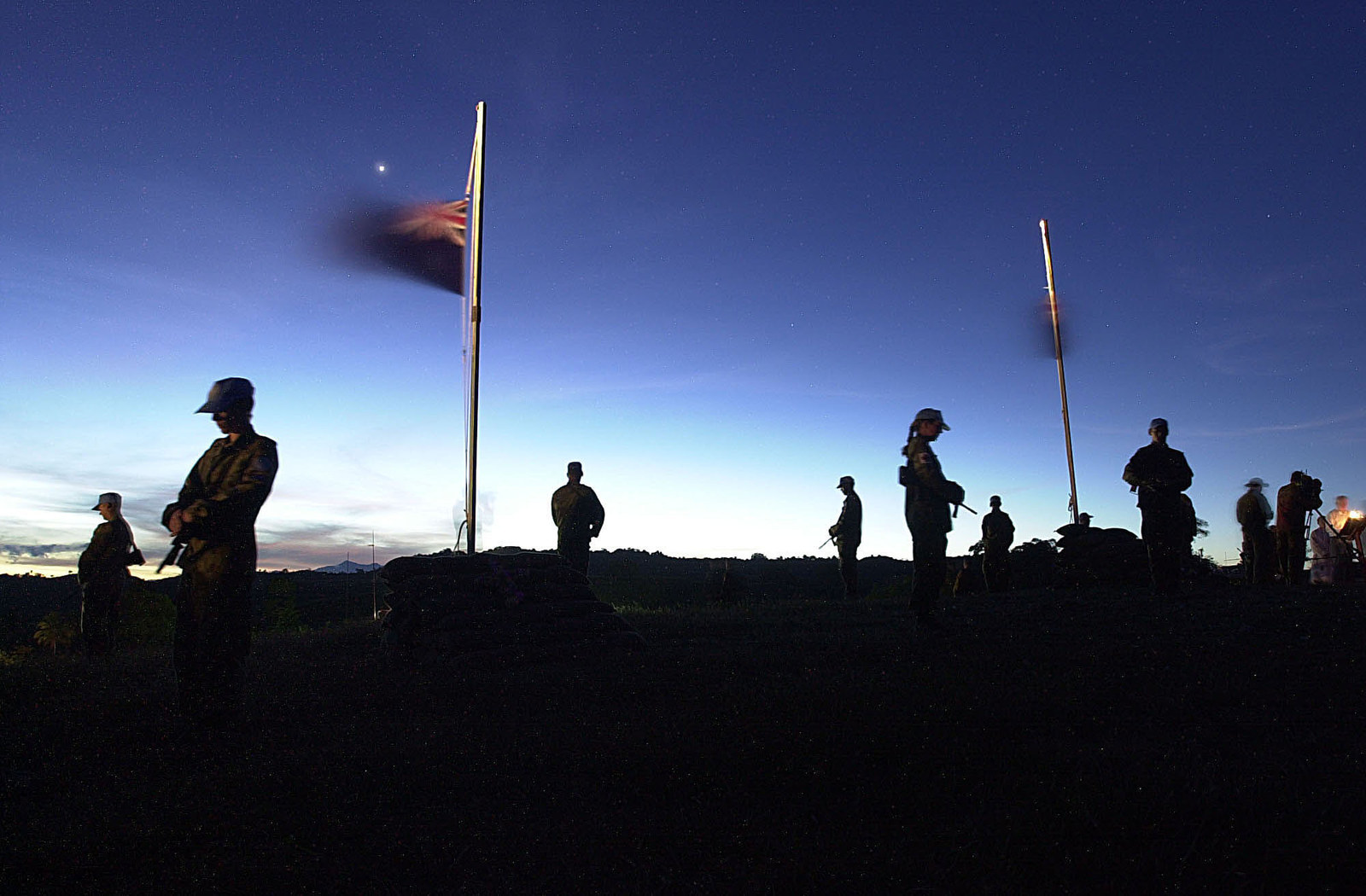The cycle is simple enough. A digger who has spent most of his or her adult life in the defence force leaves the regimented, structured life of the military to return home. Without the support of the full military bureaucracy, things can quickly begin to fall apart.
The often haunting images from theatres of war creep into a person’s head, and they find they have no one to relate to. They become isolated. They start to drink, stop eating, rarely talk and occasionally lash out, becoming uncharacteristically aggressive. Families bear the brunt of the loved one’s symptoms. Try as they might they can’t fully understand what the person is going through.
A proud soldier won’t raise their hand to admit they have a problem, fearing the stigma of mental illness or the loss of income that may come if they are medically discharged from the armed forces.
In order to escape, numb the pain or self-medicate, diggers are turning to alcohol, cannabis or even ice, beginning of a cycle which can end in the worst ways possible: addiction, domestic violence, criminality, homelessness and suicide.
There's now a new generation of young men and women - those who served in East Timor, Afghanistan and Iraq - who may need to live in this cycle for the rest of their lives.

One man who seen the cycle first-hand is NSW RSL CEO Glenn Kolomeitz. Kolomeitz toured with special operations in East Timor and twice in Afghanistan and has worked for the NSW Police as an investigator and prosecutor. Upon leaving the defence force in 2013, he set up a law firm on the NSW South Coast and offered to work pro bono for Australian veterans.
He says he was immediately “drowning” in cases.
Kolomeitz believes the processes to ensure a soldier’s mental health when he or she returns home from a conflict are a good start, but don’t do enough to ensure ongoing stability.
“The vast majority of these guys are career soldiers. They don’t want this stigma attached to them, so they won’t tell the psych they’re having any issues. They don’t want their career impacted because they know they’re going to be stigmatised and probably thrown out on a medical discharge. And they know what to say [to avoid detection]”, he said.
Once through the screening processes, soldiers often enter a period of what Kolomeitz calls “percolating PTSD”.
“They sit on the couch, on their pensions, not wanting to go out and socialise. Maybe wanting to go out and get a few drinks, which inevitably becomes a lot of drinks, and that’s when the wheels start coming off,” he said.
“Or they don’t see any benefit to their medication, or aren’t on a medication regime so they turn to drugs as self-medication. They’re sitting at home percolating.”
“Then comes the family breakdown. The family says get out, so out they go and the wheels are off.”
“Their world collapses. They don’t see any way out from this.”
Dr Nagesh Pai, a University of Wollongong psychiatrist specialising in psychopharmacology, schizophrenia and medical education, says the key to treating PTSD is recognising it early.
"I think the biggest challenge we have is identification of PTSD itself," he says. "The biggest problem, even among health professionals, is being able to identify people with PTSD. A person with PTSD won’t identify they have PTSD, unless they’re undergoing some kind of treatment."
It's for this reason that the NSW RSL in August wrote to state police minister Troy Grant, asking him to amend law enforcement regulations to ensure that soldiers diagnosed with PTSD would be treated as ‘vulnerable persons’ when they find themselves dealing with police.
This would put diggers in the same category as children, Indigenous Australians and people of a non-English speaking background, and would ensure they’re given access to legal help before being questioned. All police would need to do is ask a few questions.
For people living with PTSD, any interaction with police is a sure way to exacerbate their symptoms and can often set off a disproportianate reaction, Dr Pai says.
"Whenever there’s a history of trauma, [a person can have] an increased physiological response to bodily sensations - increased heartbeats, sweating - then they have related fears. They have an increased need for some kind of relaxation technique to calm themselves. They may start perceiving a non-threatening stimulus as a threat," he says.
"They cannot control fear associations when exposed to trauma cues, and this produces a lot of agitation in them. They’re more likely to be at risk for being short fused. They’re aware of that, which is why it causes a lot of distress for them."
"A lot of things simply don’t process in their minds."
Another symptom is gratuitous concurrence, where a person appears to be agreeing with everything an authority figure says, even if they don’t fully understand the situation. For former soldiers, it’s easy to see how this might occur.
“These guys have come from an environment where it’s ‘yes sir, yes sir’,” Kolomeitz says. “They’re used to saying yes to authority. Then they’re thrust in front of a police officer, who is in a position of authority and is asking them things. The PTSD exacerbates that gratuitous concurrence and they just say ‘yes sir, yes sir’.”
One such man is Dave, a 60-year-old former digger from Kiama on the NSW south coast, who served in East Timor, Iraq and Afghanistan and was diagnosed with PTSD in 2004.
In September 2014, Dave was involved in a road rage incident involving a young male driver. Dave says he was cut off by the young man, who then pulled over and began verbally abusing him while his daughters watched on. Dave got out of his car to confront the man and a verbal altercation ensued.
Dave immediately contacted police to report the incident, and shortly after, police came to Dave's home to speak to him. What Dave didn’t realise was that the young man had claimed Dave placed a hand on his shoulder and slapped him. He was being spoken to as a suspect, not a victim.

As police questioned Dave, he became agitated and distressed, but still didn’t realise he faced charges.
It was only when Dave was handed a statement of facts and charged with common assault that he realised he was the one under investigation.
Dave’s wife Cathy, who is also his carer, is scathing of the way police treated her husband. She wasn’t home when Dave was questioned because she was having dinner with a support group for former soldiers’ wives.
“He couldn’t cope with a situation like that. The situation was really poorly handled. They came up to our house, not one person but two of them at our house,” she told BuzzFeed News.
“He was outnumbered and he was in the dark about what was going on. So there were a whole lot of things there from an organisational point of view where nobody cared about where Dave was coming from with this. They had an agenda as to how they were going to proceed and neither of us had been notified. And I’m his carer.”
With Kolomeitz’s help, the charges were dismissed, but the barrister is still critical of how the situation was handled. Two of Dave’s PTSD symptoms include gratuitous concurrence and a propensity to simply speak too much.
“So he’s talking too much, admitting everything, saying all this nonsense” Kolomeitz says. “None of it was true. So he’s charged with all this stuff. The reality is it should never have gone that far. He didn’t even understand the fact that he was cautioned at the start.”
And while the charges were dismissed, the ongoing effects for Dave and his family have been brutal.

“During that whole procedure that this was being dealt with, he did not sleep,” Cathy said. “He rarely sleeps the whole night through, but I can tell you that for probably four, five months, it was really bad.”
“Whereas Dave's symptoms would normally be at a three or four on a good day, every day was at a nine or a 10. So many people, because they can’t see a physical symptom, they can’t see that this person has a mental illness as a result of what they’ve been through.”
Dave, who has a serious heart condition, also had his licence revoked, meaning Cathy has to pick up the slack, driving their daughters to school and Dave to his medical appointments.
Despite incidents like this, Troy Grant denied the RSL’s request to have soldiers living with PTSD treated as vulnerable persons, saying police already have extensive training in dealing with people who suffer from mental health issues and the existing regulations are enough to protect soldiers.
Grant's office did not respond to a request for comment, but NSW veterans affairs minister David Elliott told BuzzFeed News the government would continue to explore ways to help diggers.
John Bale, the founder of Soldier On, an organisation dedicated to providing support for returned servicemen and women says there’s plenty of anecdotal evidence to suggest that soldiers living with PTSD need more help, not just in dealing with police, but with accessing mental health services. He says around 20% of current or former members of the defence force are known to suffer from PTSD, but the real number may be much higher.
He wants police around the country to simply ask the question, ‘are you a current or former soldier?’ when they interact with people. If a person answers yes, steps can be taken to ensure the situation is handled properly. But Bale also knows that helping soldiers must go beyond the frontline to deal with problems at their root cause.
“We need to put in place procedures that can support them. It’s the least they deserve.”
"The big thing we’ve found is the whole concept of being brave enough to talk about this. To recognise the symptoms early and to go and seek support. Not a lot of people do that,” he says.
Like Kolomeitz, Bale says the services offered to diggers returning home are barely adequate, and don’t do enough down the track, meaning soldiers can’t access help when they need it most.
“The services provided by the ADF are quite good and holistic. But the point is, not everyone accesses it when they could and when they should and they leave it to the point where a temporary condition becomes quite chronic,” he says.
“By the time they’re putting their hands up [for help] a lot of these other things [drugs, alcohol, anxiety, depression] have taken root, so to be able to get the person back to that holistic healthy lifestyle, there needs to be a lot of work on a whole bunch of levels,” he says.
For Cathy, the lack of care for people like her husband is infuriating.
“Don’t our own military who have defended us overseas and who have had their ability to cope with day-to-day stresses stripped away from them because of their training, how then are they meant to deal with a stressful situation?”, she asks.
“We need to put in place procedures that can support them. It’s the least they deserve.”
Current or former soldiers seeking help can contact DefenceCare here.
To learn more about depression, check out the resources at BeyondBlue Australia or ReachOut. If you are dealing with thoughts of suicide, you can speak to someone immediately at Lifeline Australia on 13 11 14.

